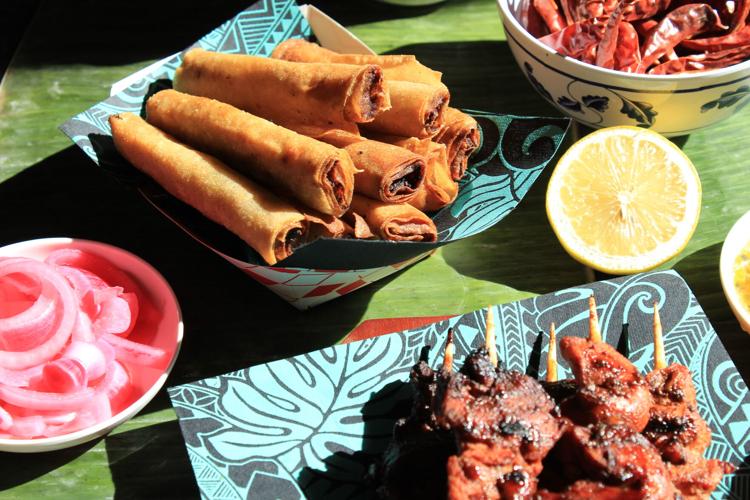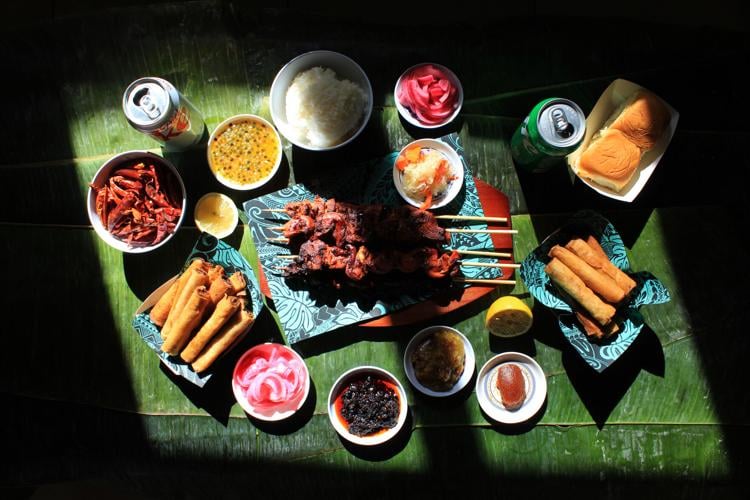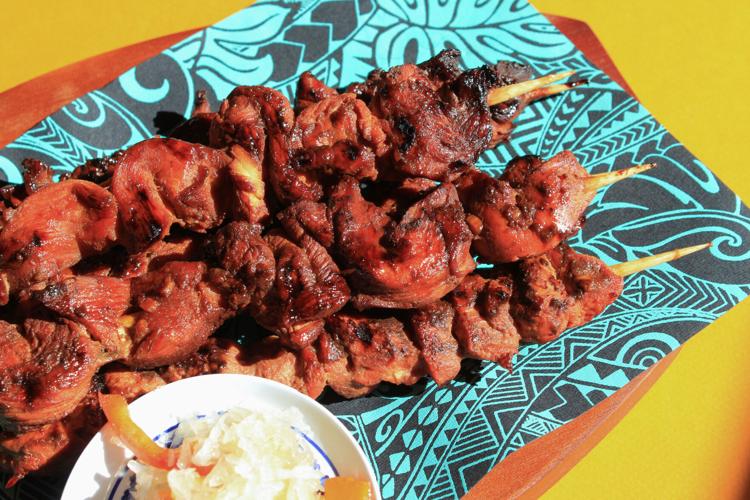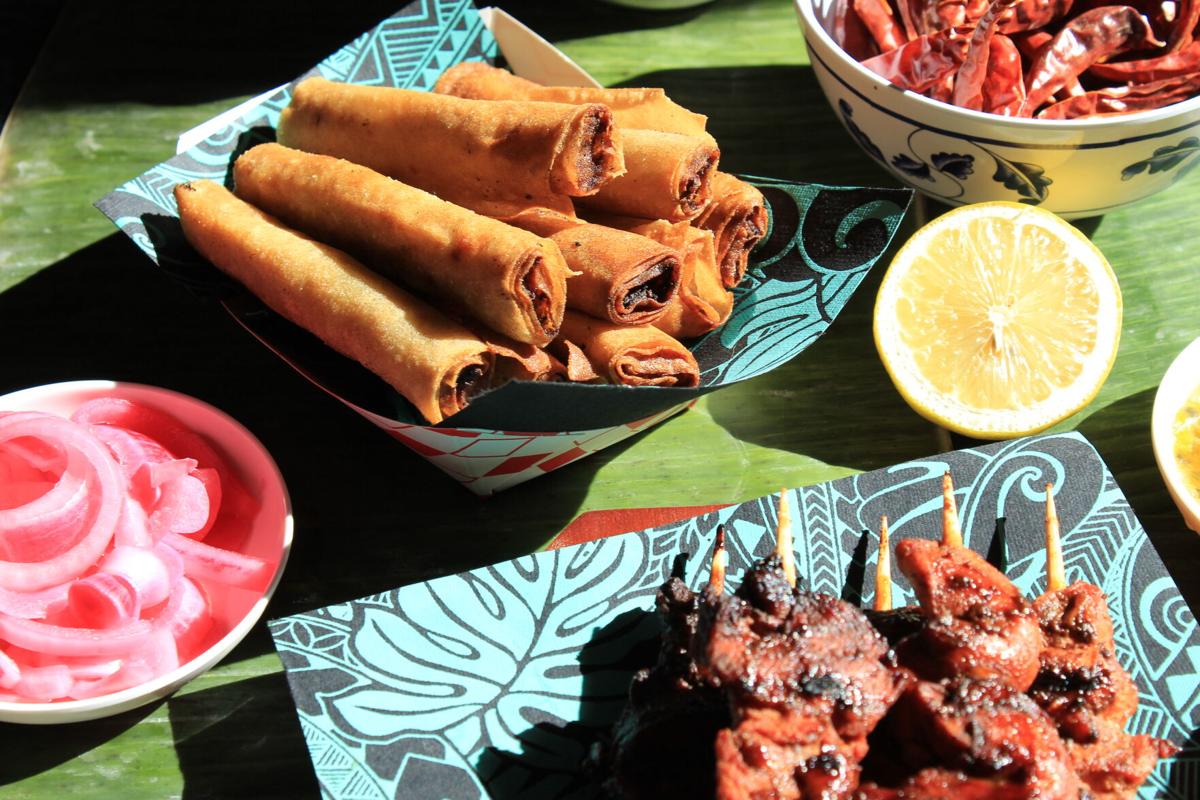Philip Rieff has been a nurse for six years, working in intensive care during the height of the COVID-19 pandemic.
“I was like, I need an outlet to process these strong emotions of having to care for people who may not see tomorrow,” Philip says.
He wanted to reconnect with his roots, sharing with his community what he grew up with.
Filipino food.
Born out of the pain of the pandemic, Philip and his partner Cody Webster started Tita Tita, serving Filipino street food under a pop-up tent at some of the coolest events around town.
Tita Tita is an ode to the aunties who sling lumpia and barbecue in metro Manila. It’s Philip’s road back to a culture he was almost expected to forget.

Tita Tita was born after Philip Rieff realized he needed an outlet during the COVID-19 pandemic.
Going back to Manila
Philip was born in the Philippines where he lived with his grandparents until he was 12, eventually making the move to New Mexico with his mom and stepdad. He has memories of aunties setting up in Manila streets, selling street corn, lechon and once, a grilled tilapia for 100 pesos.
He remembers cooking with his grandma on his days off from school. He remembers the garlic fried rice that his grandpa made every Sunday morning. He remembers his tita rolling lumpia.
“There was never a recipe. There was never a half cup of this, a quarter cup of that,” he says. “It was always this much on your palm, throw it in. (My grandma) always had this mentality of whatever feels right.
“It’s definitely been a process of trying to remember, but I think that’s part of exploring. It’s: what tastes right?”
He’s been able to rein in those memories and generational recipes, adding his own twist and experiences to make them even more special. The Tita Tita menu currently stars the well-loved lumpia, in addition to barbecue chicken and pork skewers, and sweets like turon, often described as a banana-filled dessert lumpia.
Tita Tita translates directly to “auntie auntie.” The name celebrates the Filipino women, the aunties, who strengthen their families and communities.
“You saw all the aunties and you saw them as your own — as your own mom,” Philip says.
Philip thought maybe his cooking could translate to a business idea — but he had no restaurant experience. Lucky for him, Cody has plenty.

Philip Rieff and Cody Webster are the masterminds behind Tita Tita, bringing Filipino food to Tucson.
Minnesota to LA to Tucson
Cody’s no amateur in the kitchen. He grew up in Wisconsin, surrounded by two restaurant owners: his grandma and his aunt.
“I remember drinking Shirley Temples and collecting all the swords,” he says.
By high school, Cody wanted to become a doctor and went on to study pre-med at the University of Minnesota. After graduation, he worked at a school in special education and began grad school. In the meantime, he was serving at restaurants — something he had done formally since he was 18.
Then he met Jami Olson.
“She was opening a restaurant, so I pressed pause on grad school and went with her,” Cody says. “She’s a boss ass lady and pretty well known in that community.”
He helped open the dual-concept Centro and Popol Vuh restaurants in Minneapolis, the latter of which went on to get a coveted James Beard nomination in 2019. “They’re like my babies,” Cody says of the restaurants.
But then the pandemic struck. Employees were furloughed and Popol Vuh was shuttered as the 12-table eatery just wasn’t practical during a time when people couldn’t be near one another. The restaurant eventually rebranded and reopened.
“Like everybody during COVID, you reevaluated what you want, what matters, what is life? I think everybody had this massive self-reflection moment,” Cody says. “And Philip and I had been wanting to move to LA for a long time, and I was like, maybe this was a good time. Maybe it was time to step away.”
So they did it. Cody and Philip made the move to LA, and it was a whirlwind that they loved.
“But we wanted at some point to open a restaurant. And in LA, it’s very hard to do that without extreme connections and a lot of funding,” Cody says. “And we also thought, at this point we wanted a home and to plant some serious roots. In LA, it’s not hard to do that, but it’s tricky to navigate.”
Where was their community? They tried Phoenix, San Diego, Las Vegas — then Tucson last Thanksgiving. Cody says the grip Tucson has is magical.
“We found Tucson and decided, let’s (start Tita Tita) in Tucson. We want to set down our roots here and really share these flavors I grew up with, in the Tucson community,” Philip says. “It’s a way for me to connect back to my mother country, really — and the outlet with COVID and helping me process that through food — it’s been very self-reflective.
“There was kind of a notion to erase my past and acclimate to my new society, but no — you should blend it together, you shouldn’t erase it. That’s what I’m trying to learn — trying to reconnect.”
Cody and Philip made the move to Tucson officially in June. Cody got a job at downtown eatery Bata, and Philip started working as a nurse (which he still does full-time, a job he loves and says is his calling — “to be of service to people who have gone through the worst days of their lives.”). Tita Tita was still only an idea then.
“Literally something in the air changed,” Cody says. “Do you remember the day when I was like, it’s like the Santa Ana winds, but not?” he asked Philip. “It was like something is in the air and we have to do it. I put in my notice at Bata and I was like, we have this project and we gotta get it done.”

On the menu at Tita Tita: pork and chicken skewers.
Bringing metro Manila to Tucson
In its first eight days open, Tita Tita made an appearance at six pop-up events. One night, they sold out of lumpia within an hour.
Some Tucsonans are already familiar with Filipino food. “Others are like, I didn’t know this existed and I need this in my life,” Cody says.
For now, Tita Tita is continuing its pop-up operations at community events and they've launched catering services with an expanded menu. Also on the horizon: frozen lumpia that you can pick up at local markets and throw into your air fryer.
Ultimately, though, the goal is to open a brick and mortar, first in a temporary space until they can find Tita Tita’s permanent home.
“We want to bring metro Manila to Tucson,” Philip says.
That means creating a space where the music is just right, where it’s intimate and a little bit informal like in Manila and places like Filipinotown in LA.
“Harnessing that energy — that informalness,” Cody says. “We have to ride that line, like there are things you have to take seriously, but at the end of the day, we want to have fun. We want to enjoy ourselves.”
“The Philippines were voted one of the happiest countries for several years, despite that it’s a low-income country, despite that adversity of ‘When is my next meal gonna come? When am I going to pay for my bills?’” Philip says. “Harnessing that fun, happy energy — it’s a very Filipino thing. Despite all these adversities in your life, you’re still trying to find time to have fun with your family, with your friends, and bring that energy with you always.”
Where to find Tita Tita
Tita Tita will be at the following upcoming events:
- Sonoita Vineyards, 11:30 a.m. to 5 p.m. Saturday, Nov. 12. 290 Elgin Canelo Road in Elgin.
- Rillito Park Heirloom Farmers Market, 9 a.m. to 1 p.m. Sundays, Nov. 13-27. 4502 N. First Ave.
- Market Tito's Sidewalk Sale, 9 a.m. to 1 p.m. Saturday, Nov. 19. 9105 E. Tanque Verde Road.
- Four of Wands Moon Market, 2-7 p.m. Saturday, Nov. 19. 4349 E. Broadway.
For more information, and to see where else they'll be in the near future, check out their website.

Great food and drinks start with great water
Restaurants, breweries and coffee shops know that clean, pure water is crucial. You can get that at home too with Kinetico Quality Water. Kinetico removes more contaminants than any other system. Get up to $500 off a non-electric, high efficiency, patented Kinetico system (restrictions apply). Visit KineticoTucson.com.
What does "supported by" mean? Click here to learn more.










